by Rachel Talen
I am so pleased to introduce Kyle Hausmann-Stokes as a guest blogger today. Kyle is a director/producer/writer at Blue Three Productions and former US Army Staff Sergeant/Iraq Combat Veteran.
Is comedic advertising taboo when it comes to veteran Issues?
by Kyle Hausmann-Stokes
Let’s make fun of veterans. Yikes, it feels wrong even typing the words. But this was the initial idea that led to the creation of my most recent, arguably most popular, veteran-centered PSA. It’s just 30-seconds and I dare you not to laugh.
WATCH: The Morning Routine” video.
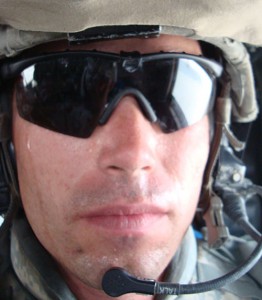 Don’t get me wrong…I’m a US Army combat veteran of Iraq myself, one who’s struggled with post traumatic stress (PTSD), and one who’s been writing/producing/directing national veteran PSAs since film school, so I know personally just how serious the issues we veterans grapple with can be. That said, from the moment I changed out my sun-bleached Army uniform for the jeans, t-shirt, and Jansport attire of a college kid, I can remember feeling slighted that all the advertising aimed at me, the returning veteran, seemed only to fit in to one of two buckets.
Don’t get me wrong…I’m a US Army combat veteran of Iraq myself, one who’s struggled with post traumatic stress (PTSD), and one who’s been writing/producing/directing national veteran PSAs since film school, so I know personally just how serious the issues we veterans grapple with can be. That said, from the moment I changed out my sun-bleached Army uniform for the jeans, t-shirt, and Jansport attire of a college kid, I can remember feeling slighted that all the advertising aimed at me, the returning veteran, seemed only to fit in to one of two buckets.
The first I called the, “We Salute You! You’re a Hero” bucket and, while we veterans are extremely grateful for this type of admiration and thanks, it doesn’t do much for us in the way of presenting a product or service that helps us to reintegrate back to civilian life. The second is the, “You Have Issues, You Need Help” bucket and, like the first, while I felt very grateful to any person or organization committed to helping veterans, I didn’t like the idea that people/society seemed to think most if not all veterans are riddled with physical, mental, and emotional issues.
Despite the fact that I had spent the past year of my life leading convoys down the most deadly roads in the world, I was still a consumer of modern media and still as able to appreciate catchy/funny/intriguing advertising as much as the next guy or gal. Why did all the hip, hilarious, viral, oh-my-god-you-have-to-see-this type videos, commercials and advertisements have to be for everyone except us veterans? It didn’t seem fair, and even though I didn’t have the means or resources to do it at the time, I made it a “life mission” to take the combat vet/filmmaker within me and combine them to create veteran-focused content that is funny. Content that is edgy, cultured, artistic, anything but the stuff that seemed to fit so nicely in the two standard issue veteran buckets.
Enter CK&D, an LA-based cause-marketing agency with a client, Easter Seals, that was looking to reach out to veterans in a new and provocative way. It had been over four years since I returned from Iraq, I had been happily producing commercials for the Dept. of Veterans Affairs and by all measures, this seemed to be the opportunity I was looking for.
The stage was set…Easter Seals, one of the largest nonprofits in the country that has been providing services and support to military and veterans for decades, was looking for a fresh way to reach today’s returning vets. I had established a relationship with their agency, CK&D, a few months prior and was fortunate to get a call from them to the effect of, “…you said you wanted to do a comedic veteran PSA? Well this may be your chance.” The rest, as they say, was history.
Phase one was to collect as many funny ideas about veterans and military culture as possible. I worked closely with my friend Trent, a fellow vet I met in the production program at the USC School of Cinematic Arts, and we riffed anything and everything that came to mind. I also reached out to the 1,600+ members of an organization I co-founded in 2012 called VFT: Veterans in Film & Television (vftla.org). We maintain a closed Facebook group, for only our members, and in it I wrote a short post explaining the opportunity and posing the simple question, “What’s funny about us? What would make you laugh if you saw it in a commercial?” The response was overwhelming; dozens of responses came pouring in within a matter of minutes. The message from my peers was clear – they too, were hungry to see veteran-centered advertising that was anything but what fit so neatly in the two buckets.
 I presented a variety of concepts to CK&D/Easter Seals and together we picked two. The first, entitled “Morning Routine,” uses humor to show how one veteran’s biggest ‘issue’ is that he is simply too fast and too efficient. The other, “The Bank,” shows a young female veteran that may have the look and feel of a chic businesswoman but, unbeknown to her, still negotiates the slow-moving bank line using the marching maneuvers she mastered in the military.
I presented a variety of concepts to CK&D/Easter Seals and together we picked two. The first, entitled “Morning Routine,” uses humor to show how one veteran’s biggest ‘issue’ is that he is simply too fast and too efficient. The other, “The Bank,” shows a young female veteran that may have the look and feel of a chic businesswoman but, unbeknown to her, still negotiates the slow-moving bank line using the marching maneuvers she mastered in the military.
We came up with narration that was equal parts funny and informative and from there, it was one of the most supportive and enjoyable production experiences I have had to date. Not only did they value my perspective and sensibilities as a filmmaker/veteran hybrid at all costs, but they were adamant the cast and crew of both PSAs be comprised of as many veterans possible. In my less than five-some years here in LA, I’ve come to know a vast array of veterans working in all facets of the entertainment industry, not to mention we are now highly organized under the banner of VFT, so accomplishing this task was an easy and enjoyable feat.
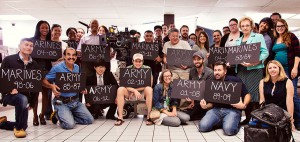 From Jose Sarduy, former Air Force pilot turned comedian that we cast for one of the lead roles, to Chloe Mondesir, who’s just a few years out of the Marine Corps, and booked the other lead role, to Michael Rha, a Desert-era Army vet that has worked as a dolly grip on films as big as Spider Man and as small as my first student film, this production was compelling to the people working in front of and the camera as well as behind it.
From Jose Sarduy, former Air Force pilot turned comedian that we cast for one of the lead roles, to Chloe Mondesir, who’s just a few years out of the Marine Corps, and booked the other lead role, to Michael Rha, a Desert-era Army vet that has worked as a dolly grip on films as big as Spider Man and as small as my first student film, this production was compelling to the people working in front of and the camera as well as behind it.
The first of the two spots was released this past Veterans Day in November and…wow, the amount of views and shares it received in just a few days was inspirational. The second spot was just released this month. The reception and efficacy of these spots will be reason enough to make more like them.
Never in a million years would I want people to laugh at us veterans but, having seen the completion of a “life mission” 4+ years in the making, I can’t help but smile to think that thousands of people are now laughing with us.
WATCH: The Bank video
Learn more about Easter Seals Dixon Center’s military and veteran services.
 If you read the post I wrote last month about how Easter Seals got its name, you know how important those little stickers we send out every year are to us. From that post:
If you read the post I wrote last month about how Easter Seals got its name, you know how important those little stickers we send out every year are to us. From that post:









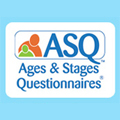

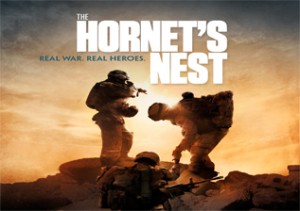
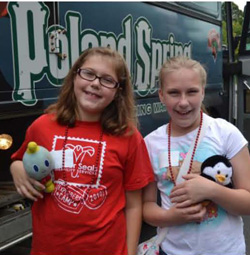 It’s May already—time to start thinking about signing up for summer camp! The idea of sending a child with special needs off to camp can seem challenging to parents and kids alike—how can you be sure that your child will get the attention he or she needs? Will your child be able to participate fully? What about the other kids? Will your child make friends? Will they understand your child’s special needs?
It’s May already—time to start thinking about signing up for summer camp! The idea of sending a child with special needs off to camp can seem challenging to parents and kids alike—how can you be sure that your child will get the attention he or she needs? Will your child be able to participate fully? What about the other kids? Will your child make friends? Will they understand your child’s special needs?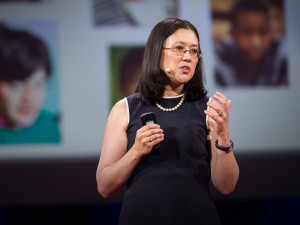

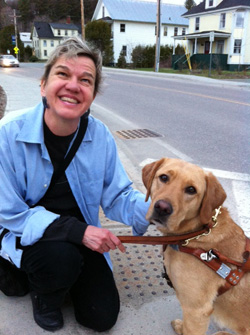 In 2013, I was awarded a writing fellowship from the
In 2013, I was awarded a writing fellowship from the